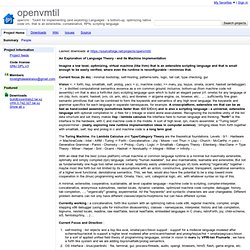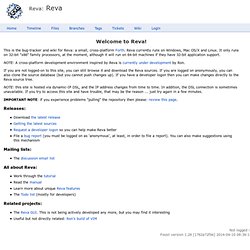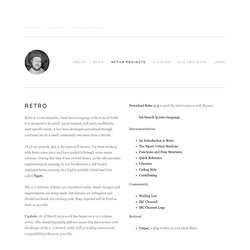

Openvmtil - a concatenative language with anonymous subroutines (blocks, quotations, combinator operators) and native code compiler - written in C, evolving toward a minimal, extensible, co-operative, all level capable language (DSL), machine code to scri. Lastest downloads at An Exploration of Language Theory - and its Machine Implementation Imagine a low level, optimizing, virtual machine (like llvm) that is an extensible scripting language and that is small enough to be easily verified, where even the runtime is reconfigurable - minimize that.

Current focus (to do) : minimal bootstrap, self-hosting, patterns/sets, logic, tail call, type checking, gui The Turing Machine, the Lambda Calculus and Type/Category Theory are the theoretical foundations. Reva: Reva. This is the bug-tracker and wiki for Reva: a small, cross-platform Forth.

Reva currently runs on Windows, Mac OS/X and Linux. It only runs on 32-bit "x86" family processors, at the moment, although it will run on 64-bit machines if they have 32-bit application support. NOTE: A cross-platform development environment inspired by Reva is currently under development by Ron. If you are not logged-on to this site, you can still browse it and download the Reva sources. If you are logged on anonymously, you can also clone the source database (but you cannot push changes up). NOTE: this site is hosted via dynamic-IP DSL, and the IP address changes from time to time. IMPORTANT NOTE: if you experience problems "pulling" the repository then please: review this page. Releases: Mailing lists: The discussion email list All about Reva: Work through the tutorialRead the manualLearn more about unique Reva featuresThe Todo list (mostly for developers) Related projects: The Reva GUI. Factor programming language.
Retro Language: Home. Retro is a concatenative, stack based language with roots in Forth.

It is designed to be small, easily learned, and easily modified to meet specific needs, it has been developed and refined through continual use by a small community over more than a decade. Of all my projects, this is the most well known. I've been working with Retro since 2001 and have guided it through seven major versions. During this time it has evolved from a 32-bit x86 assembly implementation running on raw hardware to a self hosted implementation running on a highly portable virtual machine called Ngaro. The 11.x releases of Retro are considered stable. Update: As of March 2014 work has begun on a 12.x release series.